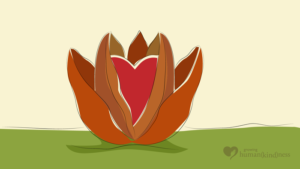When we struggle with addictive patterns like overeating or sugar bingeing, we may feel like we need to come to a place of complete abstinence in order to find relief and healing.
And yet people have told me, over and over, how hard it is for them to separate from food. When we rely on food or sugar for our well being, we can feel scared at the idea of our refuge going away.
This can leave us feeling like we’re caught in a double bind – the overeating hurts, and we want to hurt less. We want to care for ourselves without causing us pain – and yet it feels equally painful not to eat.
We can feel powerless and frustrated when we’re caught in this bind. We can collapse into a feeling of, “Why bother?” where change feels hopeless.
Our habits with food need gentleness – brute force doesn’t work well. One way we can gently support ourselves is to give ourselves small windows where we practice setting a limit and letting go of food.
This gives us a taste of what it feels like not to soothe with food when we’d normally do so. Think of it as a set time when you intentionally pause and sit with the impulse to self soothe with sugar, or food.
It’s not forever; it’s just a set time. Knowing it’s just for a set time can lower our alarm so we don’t get dysregulated – or so overwhelmed that we do nothing.
Then you can use this pause to come closer, to give yourself a taste of what you feel when you’re wanting food:
When I’m craving food, what’s there? What do I feel? What do I notice? What’s underneath?What does my body feel like? Where do I feel energy?
Whenever we intentionally pause and set a limit, all kinds of feelings and sensations can arise – and they often do! We can fear these reactions or see them as ‘something’s wrong.’
As I see it, these times are golden. The reactions – the feelings, needs, sensations and intuitions that arise – can help us better understand what drives us towards food in the first place.
An example can help. For the past two weeks I haven’t been drinking kombucha, one of my favorite treats. At the end of a long day, when I’m feeling tired and spent, kombucha helps me relax and receive comfort and care.
But now I feel this ache in the evenings where my kombucha would normally be. Some days, I feel a craving arise earlier in the day, this sense of, “Oh, a kombucha sounds so good right now!”
Ah – now I have a chance to be with this feeling more intensely. I notice how it moves, how I might want food or TV instead of kombucha. I notice the edginess of it, the ways I want that feeling of comfort and relaxation.
And ah – I notice more about the particular way that kombucha comforts me: kombucha is how I comfort myself when I’m tired because I’ve done more than I truly wanted to do in a day.
This was really helpful to see! And having a set time when I practiced not drinking kombucha is what helped me see the need for a slower rhythm that’s been living underneath my nightly kombucha treat.
Of course: I appreciate healing isn’t as simple as “just doing less now:” taking the insight I received and immediately turning it into action. It takes time, patience and pratice to integrate and learn new ways of caring for ourselves.
And giving yourself a set, doable time to ‘separate’ from food can help you become better acquainted with the ways food is caring for you – without being so alarming as a “Never again!”
This can bring empathy and kindness towards yourself. It can also help you make changes that are nourishing to you and care for the grief that often lives underneath.
Five minutes or ten minutes with a craving can show us so much. If you tend to graze the kitchen at night after dinner, and you’re curious what’s there, experiment with one evening of pausing, rather than every night. If you overdo with sugar, try one meal without a sugary treat.
Over time, we build our capacity. More importantly, we begin to care for and honor the needs that live underneath our habits. Then we don’t have to work so hard to cut out our overeating or to battle so hard with food.
Our life comes into more balance, and so the self soothing can gently fall away, with compassion, gentleness and respect.

